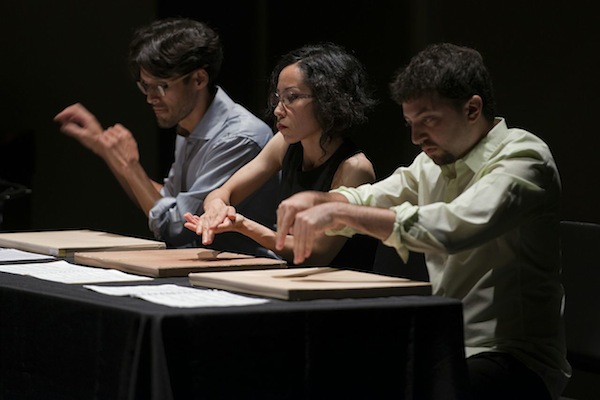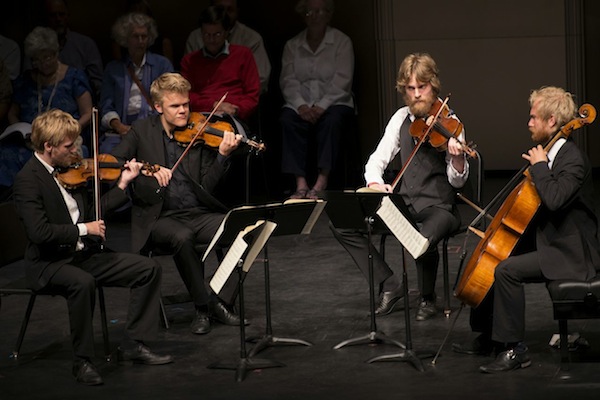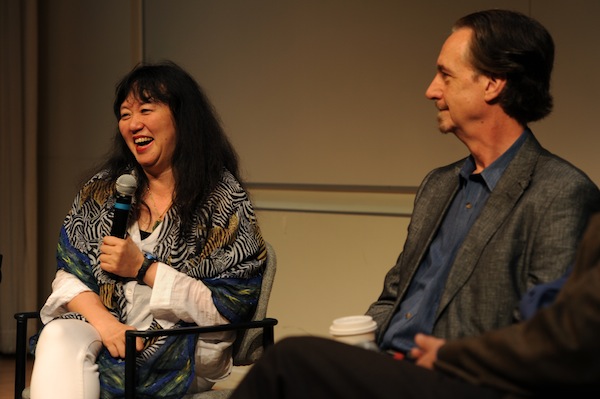
Irresistible Menlomania
By Sebastian Spreng, Visual Artist and Classical Music Writer
I have to admit that when David Finckel asked me to be Music@Menlo’s “2013 Visual Artist” I had little idea of what it was about or what I should do. Trusting the judgment of the celebrated cellist, who has just left his post in the legendary Emerson String Quartet, I was delighted to accept his invitation. When I asked him about Music@Menlo – the festival and institute he runs along with his wife, pianist Wu Han – all he said was, “It’s heaven.”
He was right, and for that alone he deserves a chronicle that – from an obvious personal perspective and not just as a participant in the 2013 season – applauds a model enterprise that should sprout not only in Menlo Park, but also everywhere and anytime that it can.
This happy gathering should be called “Wu Han-David Finckel & Friends,” but in their proverbial modesty the founders have chosen to name it Music@Menlo, a precise term that combines logo, purpose and destination. It’s the brainchild of the couple that heads the Chamber Music Society of Lincoln Center in addition to managing a busy schedule as soloists, professors at Juilliard and the Aspen Music Festival. At Menlo the two display dizzying energy that translates into a remarkable organization. Growing steadily since its inception with a pilot concert 11 years ago, Music@Menlo now takes up four weeks of the California summer and includes dozens of concerts by prestigious soloists joined by young instrumentalists, master classes, music appreciation programs, visual arts exhibits and an endless array of activities that draw a faithful, ever-growing audience. It’s also an enthusiastic and respectful audience, one that doesn’t need to be reminded to turn off cell phones and resists the temptation to react to everything with the now-endemic standing ovation.
Stent Hall, once the Douglass residence’s magnificent ballroom, can seat 200 and serves as the principal venue. The Victoria Manor houses the school, institute and festival, and the neighboring Center of Performing Arts at Menlo-Atherton hosts concerts that require greater seating capacity. Other locations are used as needed, as the festival grows at a pace as relaxed as its informal ambiance, no hints of diva-style pretension. Here, music is the sole star; you can virtually breathe it.
Fortunately, that music surpasses the other positives noted in the previous paragraphs. Every year, there’s a different theme. In 2013, it’s “From Bach,” meaning Bach’s legacy, Bach as essence, as a spreading tree, as the stream from which the German name derives, as a father whose musical progeny survives to this day. Every concert begins with a Bach piece as keynote, and the first four evenings did so, displaying, as well, original and engaging programming that left no loose ends. Even the program notes were impeccably crafted.
The venerable Ara Guzelimian kicked off the program with In the Beginning There Was Bach, a fascinating comparative journey in which David Finckel illustrated the musical solos. Afterwards, Piano/Piano, the first official concert, featured an impressive onstage collection of talent and a program to match. An explosive performance of Bach’s Concerto for Two Pianos in C Major by Derek Han, Gloria Chien, Soovim Kim, Arnaud Sussmann, Sean Lee, Kristin Lee, Keinv Rivard, David Finckel and Laurence Lesser set the tone of a memorable evening in which the only soothing moments were provided by Schubert’s Grand Rondo for Piano, Four Hands (in which Derek Han and Hyehyeon Park excelled) and Schumann’s delicious Andante and Variations for Two Pianos, Two Cellos and Horn. Rounding out the evening was an exceptional rendition of Bartók’s fierce Sonata for Two Pianos and Percussion by a literally possessed Wu Han, with the outstanding Gilbert Kalish and percussionists Christopher Froh and Ian Rosenbaum rising to the occasion.
The following evening, Ayano Kataoka joined Froh and Rosenbaum for a percussion concert that dazzled an audience whose curiosity was rewarded, leaving it astonished, initiated, addicted. An unexpected Bach, Partita No. 3 for Solo Violin, transcribed for xylophone and played by Kataoka, opened fire, followed by two selections from Argentine composer Alejandro Viñao’s Book of Grooves. The rest of the musical mosaic was assembled with humor, virtuosity and introspection, to great effect. If Mauricio Kagel’s Railroad Drama and Thierry de Mey’s adorable Table Music drew smiles, astonishment was the reaction to Colin Nancarrow’s Piece for Tape (transcribed by Dominic Murcott), Nebojsa Zivkovic’s Trio per uno, Takemitsu’s Rain Tree and two modern-day classics, John Cage’s In a Landscape and Steven Reich’s Drumming, which completed the conquest (or rather, conversion) of the audience. The petite Kataoka is a force of nature that appears to grow onstage, and Rosenbaum and Froh don’t lag behind.
The weekend culminated in the much-awaited West Coast debut of the Danish String Quartet, an ensemble that is making a splash around the world. The insolently young musicians command major repertoire displaying exceptional maturity and depth. Two Mozart arrangements of fugues from Bach’s The Well-Tempered Clavichord served as perfect appetizers for another unforgettable evening. Haydn’s Opus 76, No. 2 – Die Quinten – was performed with appropiate classic precision and simplicity. Clarity and smoothness marked the famous witches’ minuet. For Shostakovich’s Opus 57 – Piano Quintet in G Minor – Gilbert Kalish joined the group. The five performed this mournful, outraged, impotent war piece as one man, with palpable virtuosity and without concealing the piece’s mocking sneer. But there was more. The second part managed to surpass the first, featuring a paradigmatic Beethoven Opus 132. With enviable ease, the Danes conjured up the essence of Beethoven. Then, moving from absolute asceticism to sublime iridescence, they uncovered a more intimate Beethoven in the Heiliger Danksgesang adagio, played with stunning solemnity and sweetness. It was a momentous (no other term will do) debut, that of a team of musicians who vibrate in unison with a curious blend of seriousness and brashness, who strike the right balance without pretense or acrobatics. They are four to watch.
The first weekend’s three main events were accompanied by other, no less significant, performances. Virtuoso Soovin Kim met the challenge of tracing the development of the violin from Bach to Jörg Widmann by way of Biber, Telemann, Paganini, Ernst, Ysaÿe, Bartók, Harbison and Salonen in a musical marathon nearly four hours long. For their part, the Tallis String Quartet and members of the festival’s international young artists’ program delivered polished performances of Brahms’ Opus 51, Mozart’s Piano Quartet No. 2 (K.493) and Dvořák’s beautiful Piano Quintet No. 2 (Opus 81), featuring Shir Shemme, Francesca de Pasquale, Alexi Kenney, Young Shin and the noble sound of cellist Dimitri Atapine.
The genuine experience that Music@Menlo entails at every level is direct consequence of the energy of the team headed by Wu Han and David Finckel, a beloved disciple of the great Rostropovich, whose boundless humanity seemed to be evoked at every turn. To witness the meaty exchange of ideas between greats like Jorja Fleezanis and Lawrence Lesser at an open rehearsal, to see the changing of the guard from traditional paper scores to iPads, to enjoy an improvised ping-pong match (or a Frisbee contest al fresco) between soloists and students, these are not mere anecdotes out of this musical laboratory, but evidence of a lifestyle worth imitating.
It is not surprising – or accidental – that in the room at Victoria Manor where according to a legend, Leon Douglass named his invention the Victrola in honor of his wife, the passion for music known as melomania has morphed into a more healthy, lively just irresistible Menlomania.
The Festival runs until August 10, Music@Menlo Livestream 2013 Photo by Tristan Cook

Photo by Tristan Cook

Photo by Tristan Cook
Recent Content
-
Artsarticle ·
-
Artsarticle ·
-
Artsarticle ·
